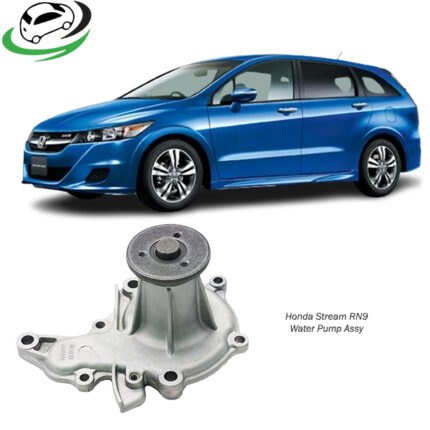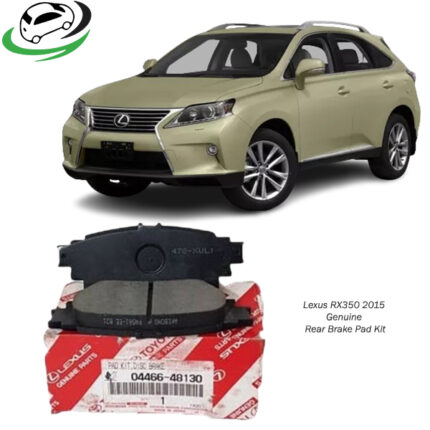-25%
Get Toyota Noah 2014 Cabin Filter (AIR-CON) AC111J
The cabin filter is a crucial component in modern vehicles, designed to improve the air quality inside the car’s cabin by filtering out dust, pollen, pollutants, and other airborne particles. Located in the vehicle’s HVAC (heating, ventilation, and air conditioning) system, it ensures that the air circulating inside the car is clean and free from contaminants, offering a comfortable and healthy environment for passengers. Over time, cabin filters have become standard features in most cars, playing a vital role in enhancing air quality and passenger comfort.
This detailed guide explores the structure, functions, types, benefits, signs of wear, and maintenance of cabin filters, ensuring that you have a comprehensive understanding of this often-overlooked but essential component.
1. Structure of a Cabin Filter
Cabin filters come in various shapes and sizes depending on the vehicle model, but they generally consist of a multi-layered structure that traps airborne particles. The typical components of a cabin filter include:
- Frame: The filter is enclosed in a sturdy frame, often made of plastic or rubber, which helps it maintain its shape and allows for easy installation and removal.
- Filter Media: The heart of the cabin filter, the filter media, is a fibrous material designed to capture and trap contaminants. The media is usually made from materials like paper, cotton, or synthetic fibers, often arranged in pleats to maximize the surface area for filtering.
- Activated Carbon (Optional): Some advanced cabin filters are equipped with an additional layer of activated carbon, which helps absorb odors, harmful gases, and volatile organic compounds (VOCs) from the air. This provides a higher level of filtration and improves overall air quality.
2. Functions of the Cabin Filter
The primary function of a cabin filter is to clean the air that enters the vehicle’s cabin through the HVAC system. Here’s how it works:
- Air Filtration: As air flows through the vehicle’s ventilation system, it passes through the cabin filter. The filter captures dust, pollen, mold spores, and other airborne particles, preventing them from entering the cabin. This ensures that the air passengers breathe inside the vehicle is clean and healthy.
- Odor Control: In filters that contain activated carbon, the cabin filter can also absorb unpleasant odors from the outside, such as exhaust fumes, industrial pollutants, and chemical smells. This enhances the comfort of the vehicle’s interior by reducing unwanted smells.
- Allergen Reduction: For passengers who suffer from allergies or respiratory conditions, the cabin filter plays a crucial role in reducing allergens such as pollen, mold spores, and dust mites. By filtering out these particles, the cabin filter helps create a more comfortable environment, especially during allergy season.
- HVAC Protection: The cabin filter also helps protect the vehicle’s HVAC system by preventing debris and contaminants from clogging the system’s components. This ensures that the heating, cooling, and ventilation functions remain efficient, and it extends the life of the HVAC system by reducing wear and tear.
3. Types of Cabin Filters
There are several types of cabin filters available, each offering different levels of filtration and performance:
- Particulate Cabin Filters: These are the most common type of cabin filters and are designed to trap solid particles like dust, dirt, pollen, and mold spores. Particulate filters are made from a pleated, fibrous material that captures airborne contaminants as air flows through the HVAC system.
- Activated Carbon Cabin Filters: These filters offer a higher level of filtration by incorporating a layer of activated carbon. In addition to trapping solid particles, carbon filters absorb harmful gases such as ozone, nitrogen oxide, and sulfur dioxide, as well as odors from the outside environment. This makes them ideal for drivers in urban areas with high pollution levels.
- HEPA (High-Efficiency Particulate Air) Cabin Filters: HEPA filters are designed to meet stringent filtration standards, removing up to 99.97% of particles as small as 0.3 microns. They provide the highest level of protection against allergens, pollutants, and microscopic particles. HEPA filters are commonly used in medical settings and high-performance vehicles.
4. Benefits of Using a Cabin Filter
A clean and well-functioning cabin filter provides numerous benefits that directly impact passenger comfort, vehicle performance, and overall health:
- Improved Air Quality: The most significant benefit of a cabin filter is the improvement in air quality inside the vehicle. By filtering out dust, pollen, and pollutants, the cabin filter ensures that passengers breathe cleaner, healthier air, reducing the risk of respiratory issues.
- Allergy Relief: For individuals with allergies or asthma, the cabin filter can significantly reduce exposure to allergens like pollen, mold, and dust mites. This is especially important during allergy season, when outdoor air contains higher levels of allergens.
- Odor Elimination: Cabin filters with activated carbon are highly effective at reducing odors from outside the vehicle, such as exhaust fumes, industrial pollutants, and even roadkill. This creates a more pleasant and comfortable driving experience.
- Protection for HVAC System: A cabin filter helps protect the HVAC system from becoming clogged with debris, dust, and dirt. By preventing contaminants from entering the system, the filter ensures that the HVAC components operate efficiently and last longer.
- Enhanced Comfort: A clean cabin filter ensures that the air flowing through the vehicle’s HVAC system is fresh and free from contaminants. This enhances the comfort of passengers, especially during long drives or in heavy traffic where outdoor air may be polluted.
5. Signs of a Worn or Clogged Cabin Filter
Like all vehicle components, cabin filters require regular maintenance and replacement. Over time, they become clogged with dirt, dust, and debris, reducing their efficiency. Here are some common signs that a cabin filter needs to be replaced:
- Reduced Airflow from Vents: One of the most noticeable signs of a clogged cabin filter is reduced airflow through the vehicle’s vents. If the filter is clogged, the HVAC system will struggle to push air through the filter, leading to weak airflow even when the fan is set to high.
- Unpleasant Odors: If the cabin filter is saturated with dirt and debris, it may start to emit unpleasant odors, particularly when the HVAC system is running. This is especially common if the filter has absorbed moisture or mold.
- Increased Allergy Symptoms: If passengers notice an increase in allergy symptoms, such as sneezing, coughing, or eye irritation while driving, it could be due to a clogged cabin filter that is no longer effectively trapping allergens.
- Foggy Windows: A clogged cabin filter can reduce the efficiency of the HVAC system’s ability to clear moisture from the windows. This can lead to foggy windows that are difficult to clear, especially in humid or rainy conditions.
- Noisy HVAC System: A clogged filter can cause the HVAC system to work harder, leading to increased noise when the system is running. If you notice unusual noises coming from the vents, it may be a sign that the filter is clogged and restricting airflow.
6. Maintenance and Replacement of Cabin Filters
Maintaining and replacing the cabin filter is essential to ensure that it continues to function properly and provides clean air to the cabin. Here are some key maintenance tips:
- Regular Inspections: Cabin filters should be inspected regularly, especially if you frequently drive in dusty or polluted areas. Most manufacturers recommend checking the filter every 12,000 to 15,000 miles, but this can vary depending on driving conditions.
- Timely Replacement: Cabin filters should be replaced according to the manufacturer’s recommendations, typically every 12,000 to 30,000 miles. However, in areas with heavy pollution, high pollen levels, or dusty environments, more frequent replacement may be necessary.
- DIY Replacement: In many vehicles, replacing the cabin filter is a simple process that can be done without professional help. The filter is usually located behind the glove compartment or under the dashboard, and most car manuals provide step-by-step instructions for replacing it.
- Choose the Right Filter: When replacing a cabin filter, be sure to choose a filter that is compatible with your vehicle. It’s also important to consider the level of filtration you need. If you live in an area with high pollution or have allergies, upgrading to an activated carbon or HEPA filter may be beneficial.
- Professional Service: If you’re unsure about how to replace the cabin filter or if your vehicle’s HVAC system is experiencing issues, it’s always a good idea to have a professional mechanic inspect and replace the filter during routine maintenance.
7. Conclusion
The cabin filter is a small yet crucial component of a vehicle’s HVAC system, providing clean and filtered air to the cabin. By trapping dust, pollen, pollutants, and odors, the cabin filter ensures a healthy and comfortable environment for passengers. Regular maintenance and timely replacement of the cabin filter are essential to ensure optimal air quality and the efficient operation of the vehicle’s HVAC system.
From improving air quality and reducing allergens to protecting the HVAC system and enhancing comfort, the cabin filter plays a vital role in vehicle performance and passenger well-being. Whether you opt for a particulate filter, an activated carbon filter, or a HEPA filter, keeping the cabin filter in good condition is essential for a safe and pleasant driving experience.
Follow us on Facebook for more parts.




Reviews
Clear filtersThere are no reviews yet.